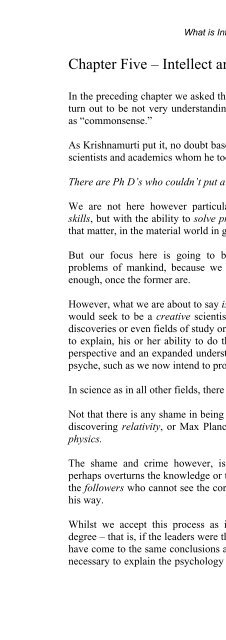07.+What+is+Intelligence+(February+2006) - Get a Free Blog
07.+What+is+Intelligence+(February+2006) - Get a Free Blog
07.+What+is+Intelligence+(February+2006) - Get a Free Blog
Create successful ePaper yourself
Turn your PDF publications into a flip-book with our unique Google optimized e-Paper software.
What is Intelligence? 46<br />
Chapter Five – Intellect and Intuition<br />
In the preceding chapter we asked the question why so many intellectuals<br />
turn out to be not very understanding people, lacking in what we regard<br />
as “commonsense.”<br />
As Krishnamurti put it, no doubt based upon long experience of the many<br />
scientists and academics whom he took part in discussions with:<br />
There are Ph D’s who couldn’t put a flower on the table.<br />
We are not here however particularly concerned with such practical<br />
skills, but with the ability to solve problems in the human world, and for<br />
that matter, in the material world in general.<br />
But our focus here is going to be on the social and psychological<br />
problems of mankind, because we think the rest can be solved easily<br />
enough, once the former are.<br />
However, what we are about to say is wholly relevant to the scientist who<br />
would seek to be a creative scientist, perhaps originating new scientific<br />
discoveries or even fields of study or technology, because as we are about<br />
to explain, his or her ability to do this will depend upon a correct inner<br />
perspective and an expanded understanding or the working of the human<br />
psyche, such as we now intend to provide.<br />
In science as in all other fields, there are the leaders and the followers.<br />
Not that there is any shame in being a follower. We can’t all be Einsteins<br />
discovering relativity, or Max Plancks creating a field such as quantum<br />
physics.<br />
The shame and crime however, is when a new leader emerges, and<br />
perhaps overturns the knowledge or theories of the former leaders, but all<br />
the followers who cannot see the correctness of his new findings stand in<br />
his way.<br />
Whilst we accept this process as inevitable in logical terms to some<br />
degree – that is, if the leaders were the equal of the followers, they would<br />
have come to the same conclusions already themselves – we feel that it is<br />
necessary to explain the psychology of what is going on in academia and


